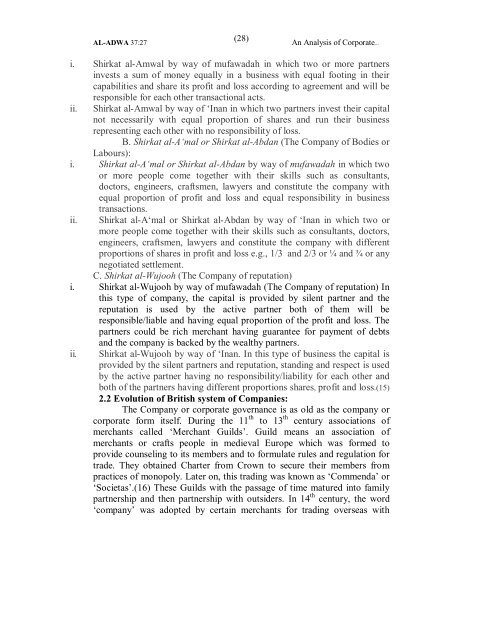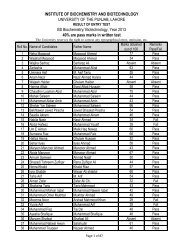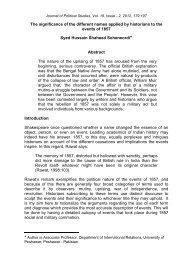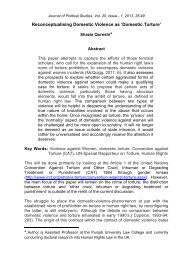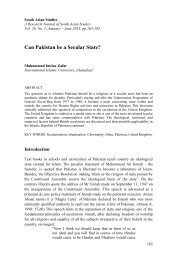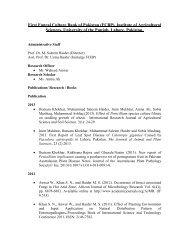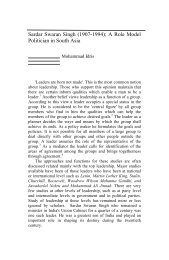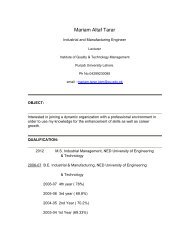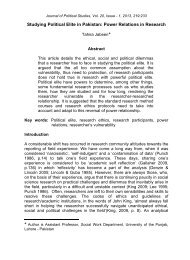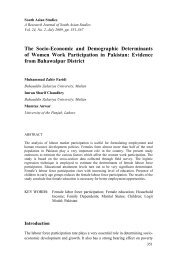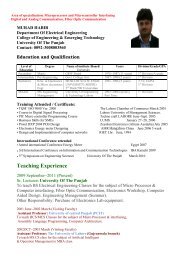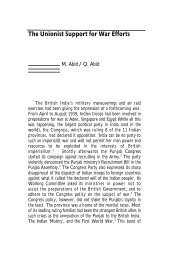Shams-ul-Basar AnAnalysis of corporate1_june2012.pdf
Shams-ul-Basar AnAnalysis of corporate1_june2012.pdf
Shams-ul-Basar AnAnalysis of corporate1_june2012.pdf
You also want an ePaper? Increase the reach of your titles
YUMPU automatically turns print PDFs into web optimized ePapers that Google loves.
AL-ADWA 37:27<br />
(28)<br />
An Analysis <strong>of</strong> Corporate...<br />
i. Shirkat al-Amwal by way <strong>of</strong> mufawadah in which two or more partners<br />
invests a sum <strong>of</strong> money equally in a business with equal footing in their<br />
capabilities and share its pr<strong>of</strong>it and loss according to agreement and will be<br />
responsible for each other transactional acts.<br />
ii.<br />
Shirkat al-Amwal by way <strong>of</strong> ‘Inan in which two partners invest their capital<br />
not necessarily with equal proportion <strong>of</strong> shares and run their business<br />
representing each other with no responsibility <strong>of</strong> loss.<br />
B. Shirkat al-A‘mal or Shirkat al-Abdan (The Company <strong>of</strong> Bodies or<br />
Labours):<br />
i. Shirkat al-A‘mal or Shirkat al-Abdan by way <strong>of</strong> mufawadah in which two<br />
or more people come together with their skills such as cons<strong>ul</strong>tants,<br />
doctors, engineers, craftsmen, lawyers and constitute the company with<br />
equal proportion <strong>of</strong> pr<strong>of</strong>it and loss and equal responsibility in business<br />
transactions.<br />
ii.<br />
Shirkat al-A‘mal or Shirkat al-Abdan by way <strong>of</strong> ‘Inan in which two or<br />
more people come together with their skills such as cons<strong>ul</strong>tants, doctors,<br />
engineers, craftsmen, lawyers and constitute the company with different<br />
proportions <strong>of</strong> shares in pr<strong>of</strong>it and loss e.g., 1/3 and 2/3 or ¼ and ¾ or any<br />
negotiated settlement.<br />
C. Shirkat al-Wujooh (The Company <strong>of</strong> reputation)<br />
i. Shirkat al-Wujooh by way <strong>of</strong> mufawadah (The Company <strong>of</strong> reputation) In<br />
this type <strong>of</strong> company, the capital is provided by silent partner and the<br />
reputation is used by the active partner both <strong>of</strong> them will be<br />
responsible/liable and having equal proportion <strong>of</strong> the pr<strong>of</strong>it and loss. The<br />
partners co<strong>ul</strong>d be rich merchant having guarantee for payment <strong>of</strong> debts<br />
and the company is backed by the wealthy partners.<br />
ii.<br />
Shirkat al-Wujooh by way <strong>of</strong> ‘Inan. In this type <strong>of</strong> business the capital is<br />
provided by the silent partners and reputation, standing and respect is used<br />
by the active partner having no responsibility/liability for each other and<br />
both <strong>of</strong> the partners having different proportions shares, pr<strong>of</strong>it and loss.(15)<br />
2.2 Evolution <strong>of</strong> British system <strong>of</strong> Companies:<br />
The Company or corporate governance is as old as the company or<br />
corporate form itself. During the 11 th to 13 th century associations <strong>of</strong><br />
merchants called ‘Merchant Guilds’. Guild means an association <strong>of</strong><br />
merchants or crafts people in medieval Europe which was formed to<br />
provide counseling to its members and to form<strong>ul</strong>ate r<strong>ul</strong>es and reg<strong>ul</strong>ation for<br />
trade. They obtained Charter from Crown to secure their members from<br />
practices <strong>of</strong> monopoly. Later on, this trading was known as ‘Commenda’ or<br />
‘Societas’.(16) These Guilds with the passage <strong>of</strong> time matured into family<br />
partnership and then partnership with outsiders. In 14 th century, the word<br />
‘company’ was adopted by certain merchants for trading overseas with


